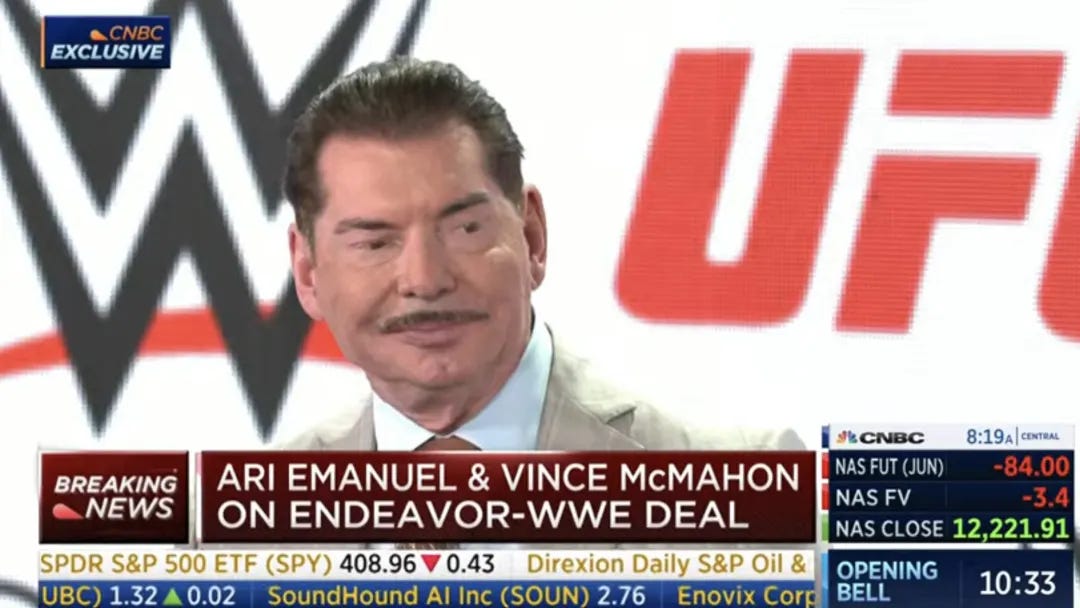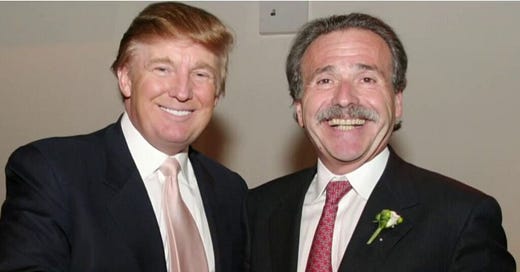As the defense rests in the sordid Trump hush money trial, it is instructive to look at some of the eccentric-moving characters “satelliting” the former President. First in that orbit is David Pecker, the American sleazemerchant, who figured so prominently in the prosecution’s case. All of Trump’s satellites have in common a certain animal loyalty, but perhaps none more so than Pecker, who even though cooperating the the prosecution, refused to bad mouth Trump. “I felt that Donald Trump was my mentor,” Pecker said on the stand. “He helped me throughout my career.”
And what a career! Longtime Chief Executive Pecker was head of American Media, Inc., from 1999 until August 2020 and before that at he was a bigwig at Hachette Filipacchi Media, where he attached himself, remora-like, to JFK, Jr in the years before the scion’s untimely plane crash. Media reporter Claire Atkinson has the whole fascinating story of how the political George magazine brought the unlikely duo of Pecker and JFK, Jr. together here.
After JFK, Jr, Pecker veered towards gossip and away from Establishment respectability. By the turn-of-the-millennium, his new company, American Media, Inc., was a confederation of salacious supermarket tabloids — the flagship Enquirer, the Star, the Globe, the Examiner, and OK! — consisting almost entirely on a diet of “love children” and the “sad, last days” of dying celebrities. Although hugely profitable, none of those properties have ever been considered prestige positions during the bitchy, glossy print era of the 80s, 90s and Aughts. Glossy magazines are far more humble (and less racist) nowadays …
Perhaps that’s why Pecker and the aggrieved former President, who never quite got along with the Establishment, coalesced? “Pecker’s tabloids have few subscribers and minimal advertising,” noted Jeffrey Toobin, acidly, in The New Yorker in 2017. “Virtually all their revenue comes from impulse purchases at the checkout counter.” One can almost feel the writer’s gaze averting. Trump’s and Peckers money was never quite sufficient enough to perfume over their testosteronal stink.
But back to loyalty … Pecker admitted under oath that he offered to be Trump’s eyes and ears as he was running for President as well as before, because he knew that the Trump staff was insufficient to the task. Pecker’s cooperation drew social and business-related rewards, to be sure. Pecker — and his National Enquirer, colluding with the disgraced Michael Cohen — would “catch and kill” potentially embarrassing rumors in the marketplace, in what can be construed as an in-kind Presidential contribution. Pecker was well versed in the practice by the time Trump ran against Hillary. From Michael Rothfeld of the NYTimes:
One of Trump’s lawyers, Emil Bove, tried to get Pecker to admit that what he did for Trump in 2016 — paying the sources of negative stories and then never publishing them, and manipulating headlines to aid his friend’s campaign — was “standard operating procedure.” Pecker obliged to a point, describing others he had helped in the past, people his employees had branded “FOPs,” for “Friends of Pecker.”
There was Schwarzenegger, who ran for governor in California’s recall election in 2003 and ultimately won. Pecker had just purchased a group of muscle and fitness magazines from Schwarzenegger’s mentor, Joe Weider, who introduced him to the star. When they met, Schwarzenegger noted that he had been on the covers of the muscle magazines dozens of times, and he had also been the focus of negative stories in the tabloids Pecker also owned.
“And he said, ‘I plan on running for governor, and I would like for you not to publish any negative stories on me now,’” Pecker recalled.
He agreed to the request and made Schwarzenegger an “editor at large.”
Charmed, I’m sure. Which brings us to the doorstep of Joe Weider, another legendary American sleaze merchant. Weider had cornered the market in one of America’s over-macho and profitable, unprestigious industries, namely — professional weightlifting. Weider essentially built his brand (weights, magazines, dietary supplements) on Arnold Schwarzenegger, who, we cannot fail to note, detests Trump to this day. Frank Zane, a former weightlifter, details to Deadspin how Weider clung to Schwarzenegger, then new on the Venice beach weightlifting scene, in 1968:
He’d just come over to the States. He was white, smooth, didn’t pose good, had missing body parts, couldn’t speak any English. I beat him, and he took it real hard. But Joe Weider immediately fell in love with Arnold and whisked him off to California, where he was moving his business empire [from New Jersey]. Arnold got a Volkswagen, paid apartment, free supplements, couple hundred bucks a week. From Joe Weider, that was pretty amazing.
Schwarzenegger became Weider’s “Great White Hope.” Arnold at the time was not as physically built as he would later become with the aid of steroids. At the time, weightlifters like the Cuban Sergio Olivera were much bigger than the future movie star would become. But Arnold, new to the American shores, was subservient and fair-skinned, unlike the dark-skinned, independent Olivera. So Arnold, despite being significantly less “put together” than Olivera, ended up “winning” — wink, wink — Mr. Universe, becoming the “face” of the Weider bodybuilding empire and thus began a profitable apprenticeship in business. Weider ultimately sold his magazines to Pecker’s American Media, with Arnold Schwarzenegger staying on as an editor “at large” of Muscle & Fitness and Flex as well as a spokesperson, a deal curiously similar to one one Trump worked out with Pecker years later …

Then there is, of course, Vince McMahon. McMahon and his wife, Linda — who was, ironically, the 25th Administrator of the U.S. Small Business Administration under Trump even though her organization, the WWE, crushed so many all-American small businesses in the territory system. “In the 1970s, the ‘Territorial’ era of professional wrestling, there were 32 wrestling promoters across North America who aired fights as far as local TV broadcasting permitted,” wrote Jarrod Facundo for The American Prospect. “Fighters often moved between territories seeking the best deals possible.” Facundo concluded: “Today, the landscape has consolidated to the point that WWE controls 85 percent of the professional wrestling market.” You can read here my substantial Substack as to how, exactly, Trump ally McMahon destroyed a chain of American small family owned businesses that went back to the turn of the century …

Although the McMahons are no longer in charge of the day-to-day running of WWE headquarters in Stamford, Vince still pops up in predictably disgusting ways on the media radar. There are recent allegations of hush money payments — or, to Trump’s testosteronal allies, “the usual” — as well as sex trafficking and even defecation during a threesome. McMahon denies the charges.
There are so many more testosteronal allies that enable Trump in defining sexual deviancy down. There is Cory Lewandowski, who served as Trump’s first campaign manager during the 2016 election and is now overseeing the Make America Great Again Action super PAC has been repeatedly accused of manhandling women (even by pro-Trump allies). And also Giuliani’s sordid sexual legal challenges. And one cannot downplay the role of sports — and bloodsports — in Trump’s appeal to Latino and African-American men (though it remains to be seen if his “outreach” to those demographics will reverse the missteps of his previous term). Sports team owners — particularly from the NFL — appear to have quite an elective affinity for the MAGA message.
Ironically, it is Stormy Daniels — the sex worker at the heart of Trump’s hush money case — who came off as the most sympathetic of all the orbiting satellites during the course of the trial. And if Nikki Haley’s suburban women are any indication as to how Trump is viewed in Charleston, in Telluride, in Salt Lake City, Dartmouth and beyond by the estrogen majority — then all the testosteronal enablers in the country will not be enough to obstruct President Biden from winning re-election, handily.
“Ukraine is undertaking an operational strike campaign. The aim of an operational strike campaign should be to break down the coherence and unified action of multiple tactical actions across a theatre. It should also degrade the ability of undertaking future large-scale campaigns in the air, on the ground and at sea. Targets include heaquarters and communications facilities, operational logistics, reserves of forces not yet engaged or dedicated to particular combat actions, fires and air defence capabilities. For Ukraine, their operational strike campaign appears to be aiming to degrade Russian fighting power in the south and east. This strike campaign is utilising long range missiles, including Storm Shadow and SCALP air-launched missiles, as well as maritime drones. Targets of this campaign include Russian logistic store locations, Crimean military targets, headquarters, and important transportation nodes. Crimea in recent weeks has seen an increased tempo of attacks by the Ukrainians. This included the most recent Belbek airbase attacks, which destroyed aircraft and airbase infrastructure, and other attacks on radar and air defence sites in Crimea. As a recent UK intelligence assessment noted, these Crimea attacks have resulted in a degradation of Russian air defence over Crimea and have had a flow on impact on other Russian air force and air defence operations more broadly. Attacks there have three key purposes: to reduce Russia’s ability to use Crimea as a launch location for missile and drone attacks; disrupt supply lines that transport fuel, ammunition and other classes of supply to the southern Ukraine battlefield; and degrading the Russian fleet operating in the region to ease the pressure on Ukrainian operations in the Black Sea, such as exporting grain.” (Mick Ryan/Future Doctrina)
“Here’s what I would say if I were a politician. I would say: “Housing, housing, housing. Around the country. Americans are struggling with housing costs. We need more housing. We need all kinds of housing in cities and towns across the country, and more housing makes it more affordable. Like, think back, years ago, when there were just a few companies making televisions. The price was high. And then tons of companies started building TVs and prices came down. That’s the same thing for housing. When we build more, the prices come down. And lower housing prices are especially important for young people in this country who need to be able to work and live and start families.” (Ramit Sethi/Politico)
“In development for five years and lavishly staged on every level, Shogun was an enormous commitment for FX, and anything short of blockbuster success would have guaranteed it could wrap up after a single, beautiful season with everyone holding their heads high. But then success came knocking. For weeks after Shogun began airing, series creators Justin Marks and Rachel Kondo had to deflect questions about a potential second season, though in one post-season interview Marks at least copped to reading the novel Clavell wrote immediately before Shogun, Tai-Pan. Of course FX was going to move heaven and earth to get more Shogun. Hitting nine million global views in its first week — even more than the second season of The Bear — Shogun was the biggest drama success for FX since those halcyon American Crime Story days in the late 2010s.” (Katey Rich/The Ankler)
“Cade Metz is a technology reporter for The New York Times. He writes about artificial intelligence, driverless cars, robotics, virtual reality and other emerging areas.” (John Ellis)





